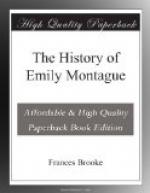Love is a pretty invention, but, I am told, is apt to mellow into friendship; a degree of perfection at which I by no means desire Fitzgerald’s attachment for me to arrive on this side seventy.
What must we do, my dear, to vary our days?
Cards, you will own, are an agreable relief, and the least subject to pall of any pleasures under the sun: and really, philosophically speaking, what is life but an intermitted pool at quadrille?
I am interrupted by a divine colonel in the guards.
Adieu! Your
faithful
A.
Fitzgerald.
LETTER 228.
To Mrs. Fitzgerald.
Bellfield, Tuesday.
I accept your challenge, Bell; and am greatly mistaken if you find me so very insipid as you are pleased to suppose.
Have no fear of falling into vegetation; not one amongst us has the least vegetative quality.
I have a thousand ideas of little amusements, to keep the mind awake.
None of our party are of that sleepy order of beings, who want perpetual events to make them feel their existence: this is the defect of the cold and inanimate, who have not spirit and vivacity enough to taste the natural pleasures of life.
Our adventures of one kind are at an end; but we shall see others, as entertaining, springing up every moment.
I dare say, our whole lives will be Pindaric: my only plan of life is to have none at all, which, I think, my little Bell will approve.
Please to observe, my sweet Bell, to make life pleasant, we must not only have great pleasures but little ones, like the smaller auxiliary parts of a building; we must have our trifling amusements, as well as our sublime transports.
My first second pleasure (if you will allow the expression) is gardening; and for this reason, that it is my divine Emily’s: I must teach you to love rural pleasures.
Colonel Willmott has made me just as rich as I wish to be.
You must know, my fair friend, that whilst I thought a fortune and Emily incompatible, I had infinite contempt for the former, and fancied that it would rather take from, than add to, my happiness; but, now I can possess it with her, I allow it all its value.
My father (with what delight do I call the father of Emily by that name!) hinted at my taking a larger house; but I would not leave my native Dryads for an imperial palace: I have, however, agreed to let him build a wing to Bellfield, which it wants, to compleat the original plan, and to furnish it in whatever manner he thinks fit.
He is to have a house in London; and we are to ramble from one to the other as fancy leads us.
He insists on our having no rule but inclination: do you think we are in any danger of vegetating, my dear Bell?
The great science of life is, to keep in constant employment that restless active principle within us, which, if not directed right, will be eternally drawing us from real to imaginary happiness.




